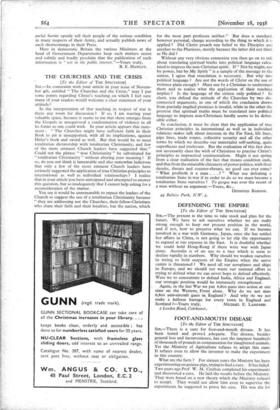THE CHURCHES AND THE CRISIS
[To the Editor of THE SPECTATOR] SIR,—In connexion with your article in your issue of Novem- ber 4th, entitled " The Churches and the Crisis," may I put some points regarding Christ's teaching on which I feel sure many of your readers would welcome a clear statement of your attitude ?
In the interpretation of that teaching in respect of war is there any room for discussion ? If so, I am wasting your valuable space, because it seems to me that there emerges from the Gospels as unequivocal a condemnation of violence in all its forms as one could wish. In your article appears this state- ment : " The Churches might have sufficient faith in their Book to pit it unsupported, with all its implications, against Hitler's book and sword as well. But that would be to meet totalitarian dictatorship with totalitarian Christianity, and few of the more eminent Church leaders have suggested that." Could not the phrase " true Christianity " be substituted for " totalitarian Christianity " without altering your meaning ? If so, do you not think it lamentable and also somewhat ludicrous that only a few of the more eminent Church leaders have seriously suggested the application of true Christian principles to international as well as individual relationships ? I realise that in your article you have anticipated and attempted to answer this question, but so inadequately that I cannot help asking for a reconsideration of the matter.
You say it would be unreasonable to expect the leaders of the Church to suggest the use of a totalitarian Christianity because " they are addressing not the Churches, their fellow-Christians who share their faith and their loyalties, but the nation, which for the most part professes neither." But does a standard, however personal, change according to the thing to which it is applied ? Did Christ preach one belief to the Disciples and another to the Pharisees, merely because the latter did not think as He did ?
Without any very obvious connexion you then go on to talk about translating spiritual truths into political language calcu- lated to impress the non-Christian spirit. If " Not by might, nor by power, but by My Spirit " is a sample of the message to the nation, I agree that translation is necessary. But why into political language ? Are not the words of Christ on the use of violence plain enough ? Must one be a Christian to understand them and to realise what the application of their teaching implies ? Is the language of the citizen only political ? In short, you defend the attitude of the Churches by two dis- connected arguments, in one of which the conclusion drawn from partially implied premises is invalid, while in the other the premise that spiritual truths must be translated into political language to impress non-Christians hardly seems to be defen- sible either.
In conclusion, it must be clear that the application of true Christian principles in international as well as in individual relations makes talk about interests in the Far East, life lines, pipe lines, trade routes, collective security and all the other terms by which we describe our materialist self-seeking, quite superfluous and irrelevant. But the realisation of this fact does not necessarily class the wish of Christians to practise Christ's principles as impractical sentimentalism. Might it not spring from a clear realisation of the fact that means condition ends, and that from the miserable chicanery of power politics, with their deceits, threats and counter-threats, no good can ever come?
" What profiteth it a man " What use defeating a totalitarian State in war if in order to do so we must become a totalitarian State ourselves ? Tu quoque was ever the resort of a man without an. argument.—Yours, &c., 44 Belsize Park, N.W. 3. D.ESMOND BARDON.
























































 Previous page
Previous page